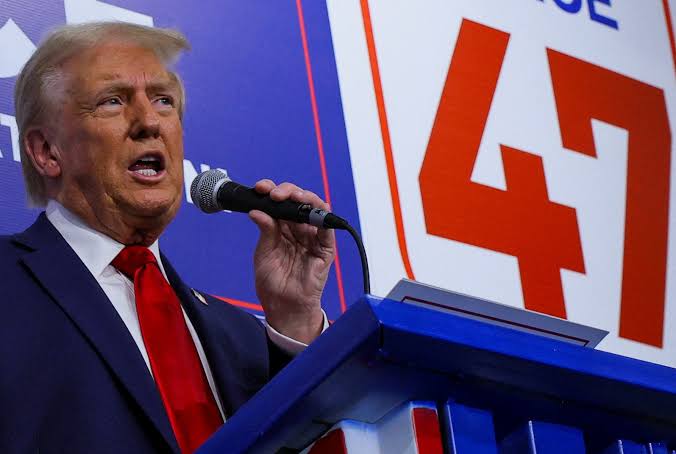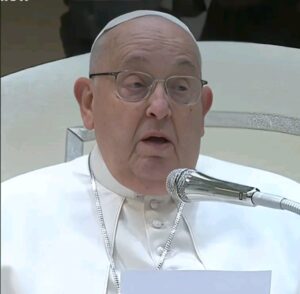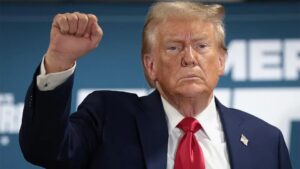
Donald Trump’s rally at Madison Square Garden (MSG) stirred deep-seated anxieties in the political landscape. Critics argue that the rhetoric espoused by Trump and his supporters at the October rally mirrored dark periods in history, drawing uncomfortable comparisons to pro-Nazi gatherings, especially the 1939 Bund rally, where Nazi sympathizers filled the very same venue with calls for a racially exclusive America. Trump’s rally was meant to mobilize his base days before the election, but the nationalist rhetoric on display and racially insensitive remarks from comedian Tony Hinchcliffe, who joked about Puerto Rico in derogatory terms, have incited a backlash across the political spectrum. Prominent figures, including Trump’s former advisor Anthony Scaramucci, joined Democrats and some Republicans in calling out the rhetoric as divisive and dangerous.
The MSG event quickly drew comparisons to the 1939 rally held by the German American Bund, which draped MSG in American flags alongside swastikas in a disturbing juxtaposition. Just as that rally married American patriotism with exclusionary ideals, critics argue that Trump’s rhetoric is similarly charged. They point out that Trump’s appeals to nationalism often rest on themes of “protecting” America from immigrants and “reclaiming” American identity, language that some find disturbingly reminiscent of an isolationist, exclusionary past.
While Trump’s campaign dismissed these comparisons, insisting the rally was intended to honor the service and dedication of Americans like firefighters, teachers, and police, the inclusion of inflammatory speakers fueled controversy. Tony Hinchcliffe’s racially charged jokes about Puerto Rico, coupled with calls to “keep America for Americans only,” have provoked a storm of criticism. Florida Senator Rick Scott, a Trump supporter, publicly condemned the rhetoric, saying, “This kind of language doesn’t represent our values.” For many, this controversy reflects growing discomfort within the Republican Party over how nationalism is used to rally Trump’s base.
A Return to Dangerous Themes?
The striking parallels to historical nationalist rallies aren’t lost on political commentators, who emphasize that the venue and language chosen for the event carry symbolic weight. Former White House Press Secretary Jen Psaki drew direct comparisons to the 1939 Nazi-sympathetic rally, noting how that event cloaked an ideology of exclusion in American symbols, a tactic she argues is again in play. Psaki stated that Trump’s rally feels like “a mini Jan. 6 rally,” invoking the violent Capitol insurrection and suggesting that this rally could incite similar sentiments of anger and division. These comparisons are further fueled by Trump’s portrayal of immigrants and minority communities as existential threats to American values, a common theme in his recent rallies.
Escalating Nationalism and Its Consequences
Trump’s rhetoric around nationalism has consistently stirred debate, but recent remarks have escalated the narrative. By evoking imagery and language often associated with divisive movements, Trump taps into nostalgia for an “America First” philosophy, albeit one that some say veers dangerously close to racial exclusivity. His rhetoric is fortified by far-right groups who identify with his portrayal of American ideals as under siege. These groups, often found at his rallies, include the Proud Boys and Groypers, both known for their support of white nationalist ideology. The convergence of these groups with mainstream supporters at events like MSG has many Americans concerned that the party is moving further toward ideological extremism, alienating minority voters and centrist Republicans alike.
For Anthony Scaramucci, who once advised Trump, the rally marked a low point in Trump’s campaign, reflecting a descent into increasingly exclusionary rhetoric that he fears could alienate the next generation. “This isn’t the America I recognize,” Scaramucci commented in a recent interview. His statement underscores a broader shift in how Republicans are responding to Trump’s evolving message, with some stepping back to disassociate from the racially charged language on display.
The Political Fallout
The fallout from Trump’s MSG rally has only intensified, sparking debates on mainstream news platforms and social media. The rally’s content has raised pressing questions about the ethical responsibility of political leaders to unify, not divide. With the GOP split over Trump’s rhetoric, figures like Florida Senator Rick Scott and others have openly distanced themselves, warning that language rooted in exclusion could cost Republicans support from moderate voters. The backlash has also reignited debates over the boundaries of free speech versus hate speech, as many argue that Trump’s messaging threatens to normalize harmful stereotypes under the guise of patriotism.
But for Trump’s base, his rhetoric remains a rallying cry. Many supporters see his speeches as unapologetic, embodying a patriotism they feel has been lost. Trump’s MAGA movement is popular for its unabashed nationalism and its promise to “make America great again,” a phrase that resonates with voters disillusioned by what they see as unchecked immigration and economic decline. Supporters argue that criticism of Trump’s MSG rally is itself an attack on free expression, and they contend that the comparisons to the 1939 Nazi rally are exaggerated.
The Path Forward: Confronting Divisive Rhetoric
As election day nears, the MSG rally has spotlighted the intense polarization defining American politics. Trump’s language may resonate with his core supporters, but it also risks driving a wedge within his own party. Political analysts warn that rallies invoking extreme nationalist themes risk long-term consequences for America’s political climate, suggesting that the message could deepen divides among voters and amplify sentiments of fear and resentment.
For Americans watching from across the country, the MSG rally is a poignant reminder of the delicate balance political leaders must strike. Trump’s rally has not only sparked outrage but also underscored the potential for history to repeat itself if leaders fail to remember the consequences of division. Whether the fallout from this event will ultimately unite or further polarize the nation remains to be seen—but the stakes could not be higher as the nation heads to the polls.






